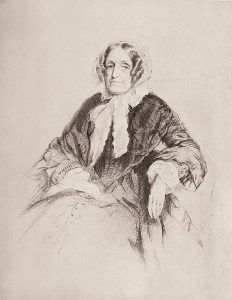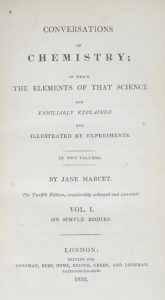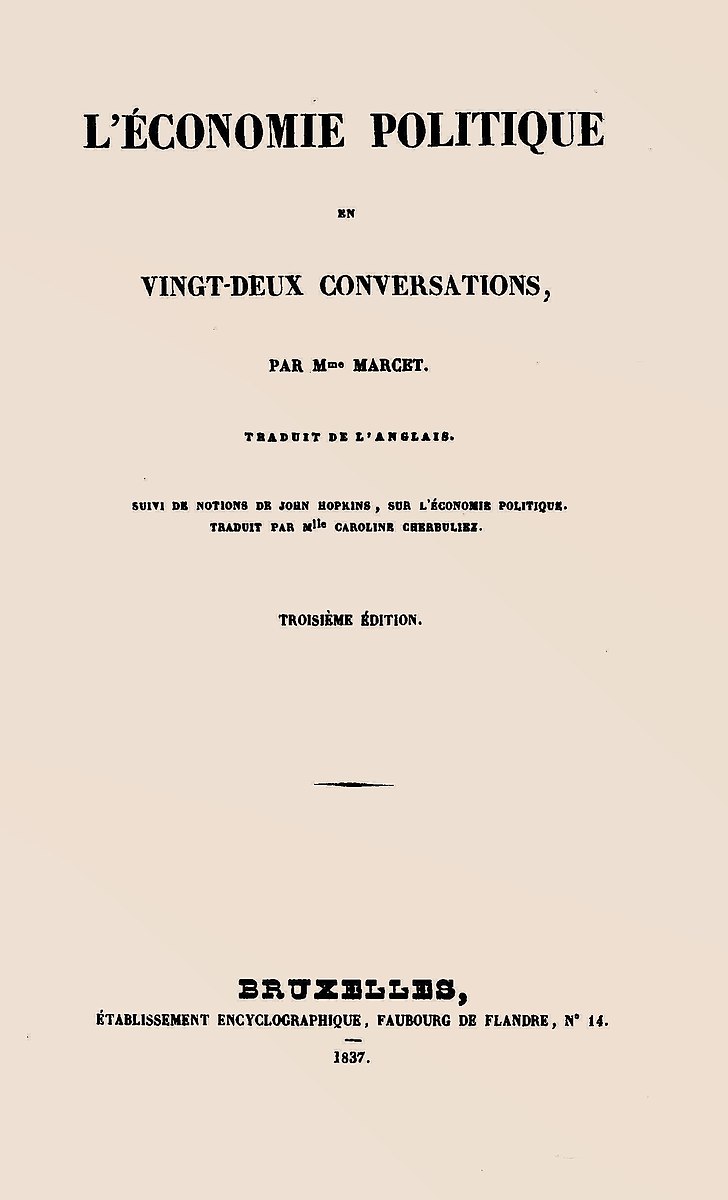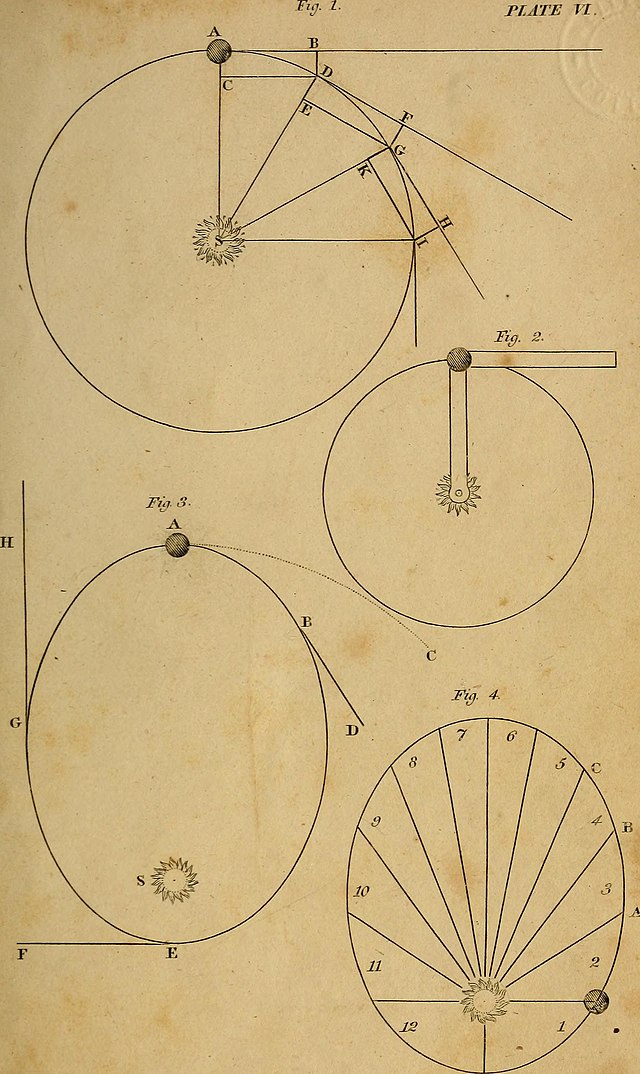 Jane Marcet
Jane Marcet
*January 1, 1769 (London, United Kingdom)
†Juni 28, 1858 (London, United Kingdom)
Jane Marcet was a British author and educationalist who played an important role in popularizing science education and advocating for women’s rights. She was born Jane Haldimand in London, England, to Swiss parents. Her family was well-connected, and she received a good education at home, studying French, German, and Italian, as well as mathematics, natural philosophy, and chemistry.
In 1799, she married Alexander Marcet, a Swiss physician and chemist, and the couple moved to Geneva, Switzerland, where they became involved in the city’s intellectual and scientific circles. In Geneva, Marcet began to write and publish educational works, including “Conversations on Political Economy,” which was based on her discussions with leading economists of the time.
Marcet was also involved in social and political causes, particularly advocating for the education and rights of women. She was a founding member of the Ladies’ Literary Society in London, which provided a forum for women to discuss literature and science, and she supported the suffrage movement and the abolition of slavery.
After her husband’s death in 1822, Marcet returned to England and continued to write and publish educational works. She died in 1858 at the age of 88, having left a lasting legacy as a pioneer of science education and a champion of women’s rights.
“Conversations on Chemistry” is Jane Marcet’s most famous work. The book is written in a dialogue format, in which a teacher, Mrs. Bryan, engages in conversations about chemistry with two female students, Caroline and Emily. The book was intended to make the study of chemistry accessible and interesting to a wider audience, particularly women.
The conversations cover a wide range of topics related to chemistry, including the nature of matter, chemical reactions, and the properties of different elements and compounds. Marcet used simple, everyday language and relatable examples to explain complex scientific concepts. For example, in one conversation, the teacher explains the principles of combustion by comparing the process to a candle burning. In another conversation, the teacher uses the example of the rusting of iron to explain the concept of oxidation.
The book was groundbreaking in its approach, using everyday language and examples to explain complex scientific concepts. It became widely popular and was translated into several languages, including French, German, and Russian. The book went through many editions, with revisions and updates reflecting new scientific discoveries and developments.
“Conversations on Chemistry” was written at a time when the study of science was not widely available to women, and the book was intended to provide a means for women to learn about and engage with science. The book played an important role in popularizing science education and advocating for women’s rights.
-
Primary Sources
Marcet, Jane Haldimand: Bertha’s visit to her uncle in England. In 3 vol. [Mikrofiche-Ausg.]. London: Murray.
Marcet, Jane Haldimand (Hg.) (1839): Unterhaltungen über die Chemie, in welchen die Anfangsgründe dieser nützlichen Wissenschaft allgemein verständlich erläutert werden. Berlin: Sander.
Marcet, Jane (Hg.) (1982): Unterhaltungen über die Chemie, in welchen die Anfangsgründe dieser nützlichen Wissenschaft allgemein verständlich erläutert werden. Nachdr. d. Ausg. Berlin 1839, nach d. 13. engl. Aufl. Weinheim: Verl. Chemie (Dokumente zur Geschichte von Naturwissenschaft, Medizin und Technik, 3).
Marcet, Jane Haldimand (1806): Conversations on chemistry. In which the elements of that science are familiarly explained and illustrated by experiments. London: Longman Hurst Rees and Orme.
Marcet, Jane Haldimand (1816): Conversations sur l’économie politique, dans les quelles on expose d’une manière familiere les élémens de cette science. Par l’Auteur des Conversations sur la chimie. Traduites de l’Anglois. Genève, Paris.
Marcet, Jane Haldimand (1817): Conversations on Chemistry. In which the Elements of that Science are Familiarly Explained and Illustrated by Experiments : Volume 1: On Simple Bodies. Cambridge, Place of publication not identified: Cambridge University Press; publisher not identified (Cambridge library collection. Physical Sciences).
Marcet, Jane Haldimand (1817): Conversations on Chemistry. In which the Elements of that Science are Familiarly Explained and Illustrated by Experiments : Volume 2: On Compound Bodies. Cambridge, Place of publication not identified: Cambridge University Press; publisher not identified (Cambridge library collection. Physical Sciences).
Marcet, Jane Haldimand (1817): Conversations sur l’économie politique, dans les quelles on expose d’une manière familiere les élémens de cette science. Par l’Auteur des Conversations sur la chimie. Traduites de l’Anglois. Genève: Paschoud.
Marcet, Jane Haldimand (1819): On compound bodies. 6. Ed. London: Printed for Longman Hurst Rees and Orme (Conversations on chemistry, Vol. 2).
Marcet, Jane Haldimand (1819): On simple bodies. 6. Ed. London: Printed for Longman Hurst Rees and Orme (Conversations on chemistry, Vol. 1).
Marcet, Jane Haldimand (1820): Conversations on natural philosophy. In which the elements of that science are familiarly explained and adapted to the comprehension of young pupils. 2nd ed., rev. London: Printed for Longman Hurst Rees Orme and Brown.
Marcet, Jane (1820): Conversations sur la philosophie naturelle. Dans lesquelles les élémens de cette science sont exposés d’une manière familière, et mis a la portée des jeunes personnes. Paris: Paschoud.
Marcet, Jane Haldimand (1820): Unterhaltungen über die National-Oekonomie, worinn die Grundsätze dieser Wissenschaft vertraulich erklärt werden. Ulm: Ebner.
Marcet, Jane (1822): Conversations on natural philosophy, in which the elements of that science are familiarly explained and adapted to the comprehension of young pupils. 3. ed. London.
Marcet, Jane Haldimand (1825): La chimie enseignée en 26 leçons, contenant le développement des théories de cette science, mises à la portée des gens du monde.̤. 2. éd., reveu et corrigée. A Paris: Audin.
Marcet, Jane Haldimand (1829): Conversations on Vegetable Physiology. Comprehending the Elements of Botany, with their Application to Agriculture : Volume 2. Cambridge, Place of publication not identified: Cambridge University Press; publisher not identified (Cambridge library collection. Botany and horticulture).
Marcet, Jane Haldimand (1829): Conversations on Vegetable Physiology. Comprehending the Elements of Botany, with their Application to Agriculture : Volume 1. Cambridge, Place of publication not identified: Cambridge University Press; publisher not identified (Cambridge library collection. Botany and horticulture).
Marcet, Jane Haldimand (1830): Bertha’s visit to her uncle in England. In 3 vol. London: Murray.
Marcet, Jane Haldimand (1830): The history of Africa. London: Colburn Bentley (Juvenil library, No. 3).
Marcet, Jane Haldimand (1832): Conversations on vegetable physiology; comprehending the elements of botany, with their apllication to agriculture. In two volumes. Second ed. London.
Marcet, Jane Haldimand (1833): Autumn. London: Longman Rees Orme Brown Green & Longman (The seasons, 4).
Marcet, Jane Haldimand (1833): The seasons. Stories for very young children. London: Longman Rees Orme Brown Green & Longman.
Marcet, Jane (1834): John Hopkins. Notions élémentaires d’économie politique. Bruxelles.
Marcet, Jane (1834): L’ économie politique en vingt-deux conversations. 2. ed. Paris, Genève.
Marcet, Jane Haldimand (1835): Spring. 2. ed. London: Longman Rees Orme Brown Green & Longman (The seasons, 2).
Marcet, Jane Haldimand (1835): Summer. 2. ed. London: Longman Rees Orme Brown Green & Longman (The seasons, 3).
Marcet, Jane Haldimand (1835): Winter. 2. ed. London: Longman Rees Orme Brown Green & Longman (The seasons, 1).
Marcet, Jane Haldimand (1836): Conversations on natural philosophy. In which the elements of that science are familiarly explained, and adapted to the comprehension of young pupils ; Illustrated with plates. Eighth Edition, enlarged and corrected by the author. London: Sprottiswoode; Longman.
Marcet, Jane Haldimand (1836): Willy’s holidays; or, conversations on different kinds of government. Intended for young children. London: Longman.
Marcet, Jane Haldimand (1845): Land und Wasser. Gespräche für Kinder von 9-12 Jahren. Hg. v. Theodor Hosemann. Berlin: Winckelmann & Söhne.
Marcet, Jane (1846): Conversations on natural philosophy in which the elements of that science are familiarly explained. Philadelphia: Grigg and Elliot.
Marcet, Jane Haldimand (1854): Summer. 6. ed. London: Longman Brown Green & Longmans (The seasons, 3).
Marcet, Jane Haldimand (1982): Unterhaltungen über die Chemie, in welchen die Anfangsgründe dieser nützlichen Wissenschaft allgemein verständlich erläutert werden. Nachdr. d. Ausg. Berlin, Sander, 1839. Weinheim: Verlag Chemie (Dokumente zur Geschichte von Naturwissenschaft, Medizin und Technik, Bd. 3).
Marcet, Jane Haldimand (1985): Conversations on political economy. In which the elements of that science are familiarly explained. New York: Pergamon Pr (The works and references of David Ricardo, 721).
Marcet, Jane Haldimand (2005): Unterhaltungen über die National-Ökonomie, worinn die Grundsätze dieser Wissenschaft vertraulich erklärt werden. Frankfurt am Main: Universitätsbibliothek Johann Christian Senckenberg.
Marcet, Jane (2009): Conversations on the Nature of Political Economy. Somerset: Taylor and Francis.
Marcet, Jane Haldimand (2010): Conversations on chemistry. In which the elements of that science are familiarly explained and illustrated by experiments. 2010.
Marcet, Jane (2010): On compound bodies. digitally printed version 2010; ed. 1. publ. 1817. Cambridge: Cambridge Univ. Pr (Cambridge library collection, vol. 2).
Jones, Thomas P.; Marcet, Jane Haldimand (1846): New conversations on chemistry. Adapted to the present state of that science ; wherein its elements are clearly and familiarly explained […] on the foundations of Mrs. Marcet’s “Conversations on chemistry. Philadelphia, Pa.: Grigg & Elliot.
Jones, Thomas P.; Marcet, Jane Haldimand (1848): New conversations on chemistry. Adapted to the present state of that science ; wherein its elements are clearly and familiarly explained ; with one hundred and eighteen engravings illustrative of the subject, appropriate questions, a list of experiments, and a glossary ; on the foundation of Mrs. Marcet’s “Conversations on chemistry. Philadelphia, Pa.: Grigg Elliott.
-
Secondary Sources
Apotheker, Jan; Sarkadi, Livia Simon (Hg.) (2011): European women in chemistry. Weinheim, Germany: Wiley-VCH.
Com és un partit polític? (1978). Barcelona: Edicions 62 (Col·lecció La Rambla, 5).
European women in chemistry (2011). Weinheim: Wiley-VCH.
Forget, Evelyn L. (2016): Jane Marcet as knowledge broker. In: History of economics review. DOI: 10.1080/10370196.2016.1267550.
Gallergo Abaroa, Elena (2010): La incorporación de las mujeres a la economía política en los albores de Siglo XIX. Jane Marcet, Harriet Maritneau, Millicent Garrett Fawcett y Harriet Taylor Mill = Women’s participation in political economy at the dawn of the nineteenth century’ : Janet Marcet, Harriet Martineau, Millicent Garrett Fawcett and Harriet Taylor Mill. In: Información comercial española.
Gender and Space in British Literature, 1660-1820 (2014). Farnham: Ashgate Publishing Ltd (British Literature in Context in the Long Eighteenth Century).
Knight, David M. (2016): Science in the romantic era. London, New York: Routledge Taylor & Francis Group (Routledge library editions Romanticism, Volume 20).
Larsen, Kristine (2014): Margaret Bryan and Jane Marcet: Making Space for “Space” in British Women’s Science Writing. In: Gender and Space in British Literature, 1660-1820. Farnham: Ashgate Publishing Ltd (British Literature in Context in the Long Eighteenth Century).
Larsen, Kristine (2017): The Women Who Popularized Geology in the 19th Century. 1st ed. 2017. Cham: Springer International Publishing; Imprint Springer.
Patterson, Gary D. (Hg.) (2018): Preceptors in chemistry. Washington, DC, s.l.: American Chemical Society; Distributed in print by Oxford University Press (ACS symposium series, 1273).
Polkinghorn, Bette A. (1986): An unpublished letter from Malthus to Jane Marcet, January 22, 1833. In: The American economic review.
Polkinghorn, Bette (1993): Jane Marcet. An uncommon woman. Aldermaston: Forestwood.
Porter, G. R. (1835): Conversations on Arithmetic. Cambridge, Place of publication not identified: Cambridge University Press; publisher not identified (Cambridge library collection. Education).
Porter, G. R. (2015): Conversations on Arithmetic. 2015: Cambridge University Press (Cambridge library collection. Education).
Shackleton, J. R. (1988): Two early female economists. Jane Marcet and Harriet Martineau. London (Research working paper The Polytechnic of Central London, Faculty of Social Sciences and Business Studies, 35).
-
Online Sources
“Mrs. Marcet“, by Harriet Martineau, Biographical Sketches, 1869
“Marcet, Jane” in C. Coquelin and G.U. Guillaumin, editors, 1852, Dictionnaire de l’économie politique [1864 ed.]
“Marcet, Jane” in R.H. Inglis Palgrave, editor, 1894-1901 Dictionary of Political Economy [1901 ed.]
“Marcet, Jane“, in Leslie Stephen & Stephen Lee, editor, 1885-901 Dictionary of National Biography [1908-09 ed]
“Jane Marcet” by Elisabeth Germe (in French)
-
ECC
-
Media
-
Projects
-
Quotes
Nature also has her laboratory, which is the universe, and there she is incessantly employed in chemical operations.
– Conversations on Chemistry, in Which the Elements of that Science Are – Familiarly Explained and Illustrated by Experiments (Volume 1) – Conversation I (p. 2), 1809.
Chemistry, which is so closely connected with Natural Philosophy must be incomplete without some knowledge of the other; for, it is obvious that we can derive but a very imperfect idea of bodies from the study of the general laws by which they are governed, if we remain totally ignorant of their intimate nature.
– Conversations on Chemistry, Conversation I (p. 9), 1836.
I am not disposed to form a very favorable idea of Chemistry, nor do I expect to derive much entertainment from it. I prefer the sciences which exhibit nature on a grand scale, to those that are confined to the minutiae of petty details.
– Conversations on Chemistry, Conversation I (p. 9), 1836.
You cannot copy content of this page












